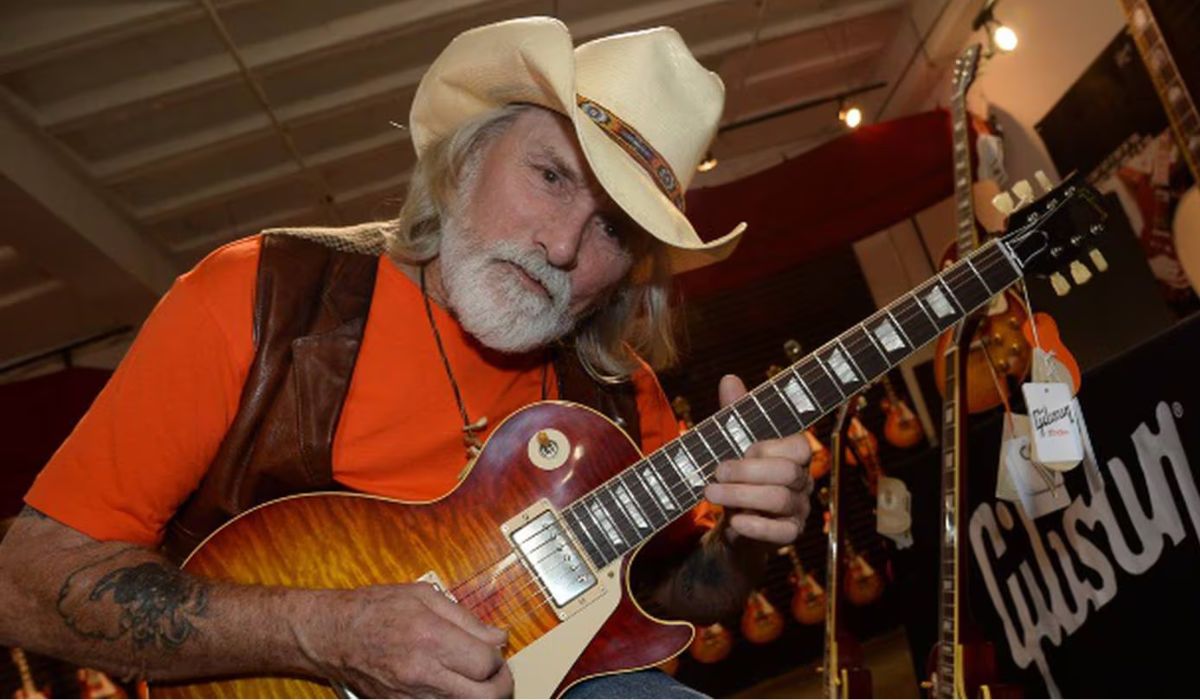Celebrity
Remembering Dickey Betts of The Allman Brothers Band

The music world has lost a towering figure and one of Southern rock’s most iconic guitarists. Dickey Betts, a founding member of the legendary Allman Brothers Band, passed away at the age of 80 on Thursday at his Florida home. The influential musician had been battling a series of health issues in recent years, including two forms of cancer and chronic obstructive pulmonary disease. But his family confirmed in a statement that Betts’ enduring musical legacy will continue to reverberate for generations to come.
“Dickey was larger than life, and his loss will be felt world-wide,” the statement read. It’s a fitting tribute for a man whose innovative playing style and songwriting helped define the Allman Brothers’ trailblazing blues rock sound and enshrine him as one of the most distinctive guitarists of his era.
To millions of fans, Dickey Betts was the embodiment of the ramblin’, free-wheelin’ spirit of 1970s rock and roll. With his lean physique, mustache and seemingly endless guitar solos, the soft-spoken Florida native cut an utterly cool figure on stage, one that director Cameron Crowe would later model Billy Crudup’s rock star character in Almost Famous after.
“Crudup’s look, and much more, is a tribute to Dickey,” Crowe once said of Betts. “Dickey seemed like a quiet guy with a huge amount of soul, possible danger and playful recklessness behind his eyes. He was a huge presence.”
That mystical persona was rooted in Betts’ musical talents. His blues, country and jazz-infused guitar flights were as adventurous as they were melodic, full of spontaneous twists and turns that pushed rock improvisation into uncharted territory. The 24-minute “In Memory of Elizabeth Reed” from 1971’s At Fillmore East stands as a landmark of Betts’ free-flowing brilliance, an epic concert jam built around the guitarist’s sublime, spiraling lines.
While his six-string pyrotechnics remain a profound influence on generations of guitar slingers, Betts also left an indelible mark as a singer-songwriter beyond the extended improvisations synonymous with the Allman Brothers. His laconic vocals and gift for breezy yet evocative melodies yielded classics like “Blue Sky” and “Jessica,” songs of pastoral innocence and restless yearning that would become beloved singalongs in the band’s fabled live shows.
But Betts’ signature track was undoubtedly “Ramblin’ Man,” a song the Allman Brothers famously resisted recording at first because of its pronounced country influence. Released in 1973, it would go on to become their biggest hit single, reaching #2 on the Billboard charts and cementing its author’s reputation as an effortlessly cool, wandering spirit.
“Ramblin’ Man” epitomized the spirit Betts brought to the Allman Brothers from the very beginning. Born Forrest Richard Betts in 1943, the future guitar hero grew up in a musical family in West Palm Beach, Florida, first picking up the ukulele at age 5 before mastering a dizzying array of stringed instruments like the banjo and mandolin as a teen.
By the late 1960s, he had joined forces with Duane Allman, Gregg Allman and the other vagabond musical souls that would reshape American rock with the formation of the Allman Brothers Band in 1969. While Duane handled much of the fiery lead guitar work on classic early albums like their self-titled 1969 debut and Idlewild South, Betts’ intricate playing and writing were integral parts of the group’s groundbreaking sound from the start.
When Duane was killed in a motorcycle accident in 1971, just as the band’s career reached meteoric heights, it was up to Betts to carry the mantle as the Allmans’ primary lead guitarist going forward. He more than rose to the occasion, blossoming into a true guitar anti-hero whose trance-like escapades became the stuff of legend among the band’s rabid following. At venues like the Fillmore East, he stretched out on marathon excursions full of thrilling dips and dodges in and out of sacred swampy Southern grooves.
The Allman Brothers continued to reach even greater commercial success thanks to hits like Betts’ radio staples “Ramblin’ Man” and the shimmering “Jessica.” But the band was plagued by bitter infighting, drug casualties like Gregg Allman’s brush with death, and a seemingly endless cycle of breakups and reunions. Betts himself endured a layoff in the late 1970s after famously getting into a backstage brawl with a security guard. But the guitarist always came rambling back to reclaim his spot as the Allman Brothers’ instrumental talisman until their final farewell tour in 2014.
In the wake of Betts’ passing, musical peers past and present flooded social media with tributes to his groundbreaking abilities and undying influence. The Allman Brothers’ longtime pianist Chuck Leavell summed up the sentiments best:
“Dickey was one of the most unique guitar stylists in the world, and you knew it was him when you heard him on record or live, He leaves an enduring and enviable legacy that we will all be celebrating for eternity.”
While his health woes kept him largely out of the public eye in recent years, footage of Betts ripping through yet another extended mind-bender will ensure that legacy as both a guitar innovator and the ultimate musical rambler lives on. On stage, channeling invisible spirits, the man known to many as just “Betts” was forever lost in his own restless reverie.
It’s a journey that sadly came to its earthly end this week, one final curtain call for the inimitable ramblin’ man. But Dickey Betts’ spirit will continue drifting out across the cosmos, his questing guitar lines accompanying all those other ramblers forever wandering on.
